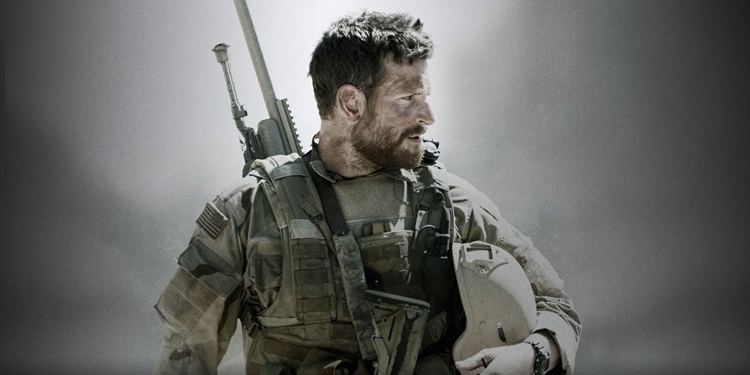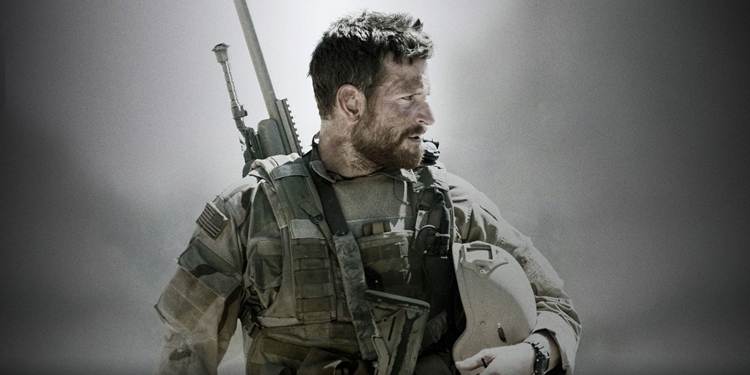
American Sniper (2015) Directed by Clint Eastwood. Starring: Bradley Cooper, Sienna Miller, Kyle Gallner. IMDB says: “Navy SEAL sniper Chris Kyle’s pinpoint accuracy saves countless lives on the battlefield and turns him into a legend. Back home to his wife and kids after four tours of duty, however, Chris finds that it is the war he can’t leave behind.”

Clint Eastwood’s latest American Sniper wasn’t even on my radar until I saw the TV spot for it a few weeks ago. The mini trailer only focused on one tense scene of the film and interrupted it with dozens of glowing pull quotes from highly respected critics. I’m not keen on most of Eastwood’s directorial work (loved Mystic River but have been increasingly let down by anything else he’s done) but that effective little snippet of marketing was all I needed to push any further doubts I might have had about the movie aside. But as it turns out for me, no other movie from 2014 would stand to fill me with such hostility.
The movie centers on the life of Chris Kyle, a simple Rodeo man from Texas that decides to join the Navy SEALs one day when he is drunk and realizes that fighting “savages” would make for a great career change. He joins the U.S. military, finds a fiancé/mother of his child at a bar and goes on to become the Most Lethal Sniper in U.S. Military History. It’s incredibly difficult to hide my sarcasm here. I want to just jump right into my major problems with the film but in order to do so I’ll have to describe a number of scenes in the movie in detail so consider this your spoiler warning.
If you haven’t seen the movie yet: I don’t recommend it. It’s not a particularly well-made film and it doesn’t handle the subject matter with the attention it deserves. My review spoils a number of scenes so only read ahead if you are okay with that.
I’d like to start at the beginning. Only a few minutes into the movie, the audience is treated to a scene from Chris’ childhood. It’s really the only time in the film that we have any flashback this far back into the protagonists’ life but it sets up not just the soldier’s mindset but also all of the film’s moral messages that will follow. We meet Chris and his younger brother Jeff when they are just boys. Jeff, the smaller and weaker of the two, is teased and beat up on the school playground. It looks grim until Chris steps in not only to save his brother but also beat the shit out of the other kid. After the incident, Chris’ father preaches to the boys that there are certain types of people in the world. There are Shepherds – those that try to do good in the world, Sheep – the weak and defenseless, Wolves – the big bads that are pure evil and then there are the SHEEP DOGS – those that are here to protect the sheep and confront the wolves. And while I’ve never seen a sheep dog fight a wolf, I understand this speech and its impact on young Chris. When I first watched the scene I thought that although it was a little corny, it seemed to get its point across quickly enough to jumpstart the underlying drive behind someone like Chris. That would have been fine and dandy if it had not colored the entirety of the rest of the movie for me – essentially validating everything the father said through an extreme manipulation of hero worship.
This is my biggest issue with American Sniper. Instead of making a complicated, thought-provoking drama about what its like to go through the trauma of war, Eastwood makes frequents stops in his film to make sure he is saying exactly what he wants to say about Kyle – this man is a hero, plain & simple. In real life, the sniper notes how much he enjoyed killing and even makes a load of bogus claims in his autobiography about other people he has killed outside of war. But in the movie version, Chris is constantly torn and conflicted about his status as a legendary killer. Normally, I don’t fault a film’s narrative if the choice is to stray away from true story facts but here we have the account of the most prolific sniper in the history of the U.S. and we are supposed to believe that Kyle earned this title by being a thousand times better at his job when in reality he said he shot absolutely any military age male in sight.
The danger in changing the whole narrative of Chris’ actual experience is that the film creates a character that would not exist the same way the real Chris Kyle did. Why deviate from the autobiography? Why not make an authentic representation of the man from his own words? The only conclusion I can come to is that the filmmakers didn’t trust the audience to hear a story about a man who loved his job, a job that happened to be killing other human beings. But that is what happened and does happen in war. The title of “hero” is a complicated one that shouldn’t be stripped down to the obvious notes displayed throughout this film. We should see these men at war for who they truly are and what they go through. Some may feel that way when watching Sniper but this story of Kyle has been too distorted and manipulated for me to see anything but the strings behind the curtain. Eastwood had every opportunity to make an authentic movie about this man’s story and I’m very sad that he chose a more fictionalized path.
American Sniper never trusts the viewer enough to reflect in their own way about what they’re shown. Often times the movie feels like it is really trying to give an in-depth look at PTSD and the psychological complications experienced by soldiers. I continued to think that these strange moments of validation for Chris would be given an honest look by the end of the film. But again, there isn’t room for this type of reflection. Chris’ PTSD matters but almost no one else in the film that is suffering from PTSD is given any compassion and they certainly aren’t showcased in the same favorable light. Rethinking the war? Upset at America for sending you there? Don’t believe there’s a God out there? Well you’re all sheep so don’t expect to survive in combat or remain a character in the film (Seriously, what happened to Jeff? Are we just supposed to not care about him because he was unpatriotic?)
It’s very difficult for me to believe anything else was supposed to come out of these scenes. Chris never waivers in his pro-war, anti-Iraq sentiments, even after getting innocent people killed as a direct result of his disobedience. These moments seem to trouble him but the movie never has him come to terms with what he’s been through. Chris finally sees a therapist late in the film who urges him to open up about his time in combat, asking him if he feels conflicted about the people he’s killed. Chris responds like any sheep dog would and says the only thing he regrets is not helping other soldiers. Thankfully, the therapist introduces him to a bunch of military vets that need help right here in the states. Chris is now rehabilitated.
Setting aside my thematic issues with the narrative, American Sniper doesn’t fare much better at the base levels of filmmaking. The direction was relatively insignificant but the score did a great job making sure you knew what to feel during just about every important moment in the film. Again, no room for reflection or interpretation. The two main performances from Sienna Miller and Bradley Cooper are to be applauded, especially with Cooper’s understated acting, but unfortunately the corny and clichéd moments in the script don’t help them to elevate the movie as a whole. I’m baffled by this movie’s Academy Award nomination for Adapted Screenplay for several reasons. For starters, there are numerous scenes that had me rolling my eyes with an increased level of desperation. About 80% of the scenes between Kyle and his wife are so embarrassing that I’m really confused how anyone took them seriously – their first meeting at the bar, their date at the carnival (where he shows his admiration by shooting some targets and winning her a Teddy Bear) or lines like “Even when you’re here, you’re not here.” All of their time together onscreen deserved a better script. Honestly, this whole movie deserved so much more.


